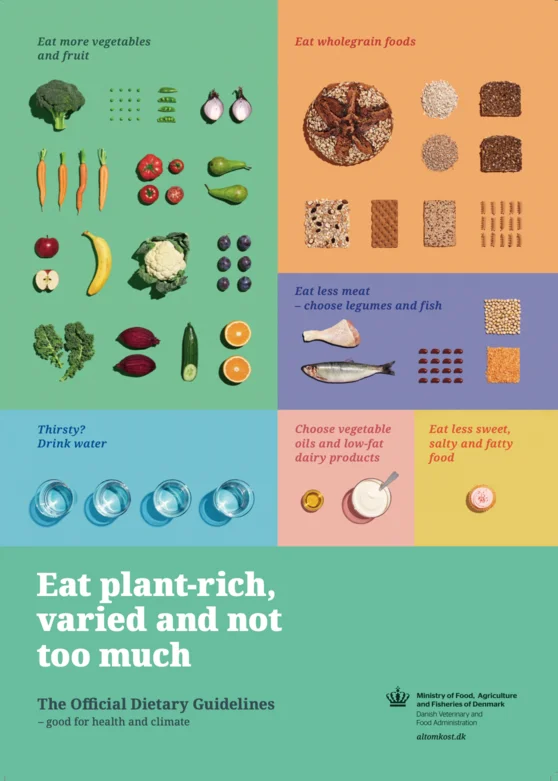In 2021, the release of the official Dietary Guidelines provided a comprehensive framework for healthy eating, influenced by the Nordic Nutrient Recommendations (NNR) from 2012.
Denmark’s Official Dietary Guidelines, updated in January 2021, emphasize not only promoting healthier eating habits but also reducing the climate footprint associated with food choices. Here are the key principles of these guidelines:
1.Eat plant-rich, varied and not too much: Encourages a predominantly plant-based diet that is diverse and in appropriate portions.
2.Eat more vegetables and fruit: Emphasizes increasing consumption of vegetables and fruits, which are rich in essential nutrients and fiber.
3.Eat less meat – choose legumes and fish: Recommends reducing meat intake and opting for plant-based proteins such as legumes (beans, lentils) and fish, which are generally lower in greenhouse gas emissions compared to red meat.
4.Eat wholegrain foods: Suggests consuming whole grains instead of refined grains for better nutritional value and fiber content.
5.Choose vegetable oils and low-fat dairy products: Prefers vegetable oils over animal fats and encourages low-fat dairy options to reduce saturated fat intake.
6.Eat less sweet, salty and fatty food: Advises limiting intake of foods high in added sugars, salt, and unhealthy fats.
7.Thirsty? Drink water: Promotes water as the primary beverage choice for hydration, instead of sugary drinks or beverages with a high environmental impact.

These guidelines are designed not only to improve individual health outcomes but also to align dietary choices with sustainability goals, specifically aiming to lower the environmental impact of food consumption. This dual focus reflects a growing recognition of the interconnectedness between dietary habits, health, and environmental sustainability.
Recently, the 2023 update to the NNR has prompted slight modifications to these guidelines, focusing on enhancing nutritional intake without substantial changes to established dietary practices.
Key Adjustments and Their Implications
The revised guidelines recommend minor increases in specific food categories:
- Whole Grains: The daily recommendation has risen from 75 grams to 90 grams, emphasizing the importance of whole grains in a balanced diet. This adjustment equates roughly to an additional slice of whole grain rye bread daily, encouraging sustained efforts to incorporate more whole grains into meals.
- Eggs: The guideline for egg consumption has been adjusted from 2 to 3 eggs per week. This change reflects the nutritional benefits of eggs within a diverse diet, aligning with broader sustainability goals.
- Dairy Products: Recommendations for dairy intake have been refined, particularly for children and adolescents aged 4-17, suggesting an increase of approximately half a glass of milk daily. This adjustment aims to support optimal nutritional intake during critical growth stages.
Expert Insights and Public Impact
The Danish Veterinary and Food Administration, underscores the guidelines’ alignment with current research. She notes that while these adjustments are minor, they are crucial for maintaining relevance and effectiveness in promoting health and sustainability.They highlight that despite the adjustments, most Danes already meet the recommended intake levels for dairy and eggs. Therefore, the practical impact on average consumption patterns is expected to be minimal, reaffirming the consistency of Danish dietary habits with established guidelines.
Future Directions
Looking ahead, the Danish Food Agency continues to evaluate supplementary dietary advice tailored for specific groups such as pregnant women, lactating mothers, and vegetarians. This ongoing assessment aims to ensure these populations receive adequate nutrients in alignment with their unique dietary needs.
As dietary patterns evolve and new research emerges, periodic updates to dietary guidelines remain essential. By integrating the latest scientific insights, policymakers and health experts can continue to empower individuals to make informed choices that promote long-term health and well-being.
In conclusion, the minor adjustments to the official Dietary Guidelines underscore Denmark’s commitment to supporting both individual health and environmental sustainability through balanced dietary recommendations. These updates serve as a testament to the evolving nature of nutritional science and its ongoing impact on public health policy.
The Danish Veterinary and Food Administration expects to be ready with any adjustments for these target groups in autumn 2024.
For more information visit:
https://en.foedevarestyrelsen.dk/food/nutrition-and-health/the-official-dietary-guidelines
